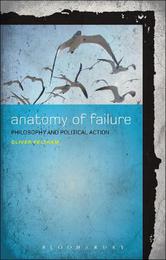
|
Anatomy of Failure: Philosophy and Political Action
Paperback / softback
Main Details
| Title |
Anatomy of Failure: Philosophy and Political Action
|
| Authors and Contributors |
By (author) Oliver Feltham
|
| Physical Properties |
| Format:Paperback / softback | | Pages:304 | | Dimensions(mm): Height 216,Width 138 |
|
| Category/Genre | Western philosophy from c 1900 to now
Social and political philosophy |
|---|
| ISBN/Barcode |
9781441158642
|
| Classifications | Dewey:320.01 |
|---|
| Audience | | Undergraduate | | Postgraduate, Research & Scholarly | |
|---|
|
Publishing Details |
| Publisher |
Bloomsbury Publishing Plc
|
| Imprint |
Bloomsbury Academic USA
|
| Publication Date |
14 March 2013 |
| Publication Country |
United States
|
Description
Modern liberalism begins in the forgetting of the English Revolution. Anatomy of Failure seeks to right that wrong by exploring the concept of political action, playing its history against its philosophy. The 1640s are a period of institutional failure and political disaster: the country plunges into civil war, every agent is naked. Established procedures are thrown aside and the very grounds for action are fiercely debated and recast. Five queries emerge in the experience of the New Model Army, five queries that outline an anatomy of failure, isolating the points at which actors disagree, conflict flares up, and alliances dissolve: Who can act? On what grounds? Who is right about what is to be done? Why do we succeed or fail? If you and I split, were we ever united, and to what end? The application of these questions to the Leveller-agitator writings, and then to Thomas Hobbes and John Locke's philosophies, generates models of political action. No mere philosophical abstractions, the Hobbesian and Lockean models of sovereign and contractual action have dominated the very practice of politics for centuries. Today it is time to recuperate the Leveller-agitator model of joint action, a model unique in its adequacy to the threat of failure and in its vocation for building the common-wealth. Anatomy of Failure is ideal for upper-level undergraduates and postgraduates taking courses in Contemporary Political Philosophy, Continental Philosophy, Modern European Philosophy, Contemporary French Philosophy, Critical Theory and Radical Political Thought.
Author Biography
Oliver Feltham is Associate Professor of Philosophy at the American University of Paris, France.
ReviewsStaged with theatrical flair, Oliver Feltham's new book about the relation between principled ideals and political realities avoids the twin perils of 'angelic critique or servile apology', and finds in the fragile but revolutionary alliance of the Levellers and the New Model Army some answers to perennial questions about the relation between right and might. -- Peter Hallward, Professor of Modern European Philosophy at Kingston University London, UK and author of The Will of the People (2013) Feltham's analysis...is by turns illuminating and breath-taking. His erudition ranges effortlessly over the complete works of Hobbes, Locke and Spinoza. He reconstructs, with economy and accuracy, the de-substantialisation of classical conceptions of action and the modern transfer of the ability to act to judicial and political institutions... This is a book that is materialist and rationalist--an enlightenment work--yet refreshingly original and strikingly assured... It is sharply written--concise and accessible, yet without condescension, sometimes personal, never scholastic--because it is conscious of being the start of something important. This is a new approach within political philosophy to the imbrication of historical action and philosophical conceptuality, one that refuses the "siren's lure" of the concept of practice, yet responds to some of the same imperatives as the philosophy of praxis. Perhaps it should be described as a cetology of the Leviathan, written from the perspective of sympathy for the harpooner. -- Geoff Boucher, Deakin University, Melbourne, Australia Anatomy of Failure is an intriguing philosophical inquiry. It pursues an ambitious methodological approach that avoids the idealism, or transcendentalism, of the political philosophy that philosophers like Raymond Geuss and Amartya Sen have criticized recently. Its reconstructive method is closely attuned to actual political practice, but strives to refrain from vindicating the status quo. Therefore it focuses on those moments of political rupture in which many sorts of political practice represent themselves as forms of critique of the dominant political order. This is an appealing approach, and Feltham shows how well it works for "unveiling the forgotten model" (p. 251) of joint action. -- Julian Culp, Goethe University, Frankfurt am Main (Germany) * Notre Dame Philosophical Review *
|